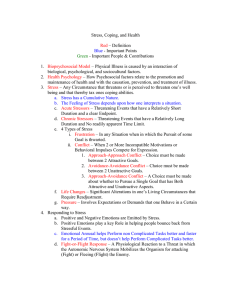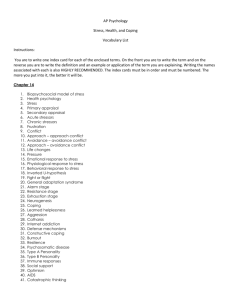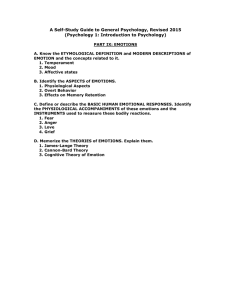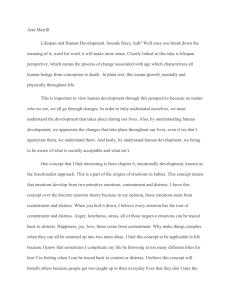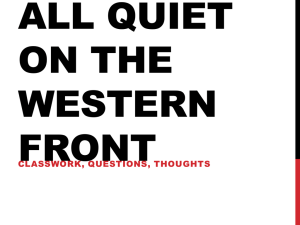Emotions, Stress, and Health
advertisement
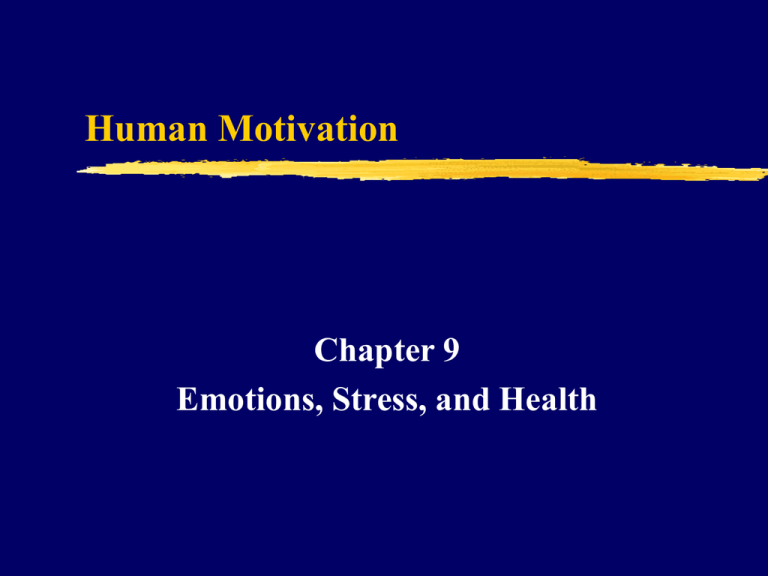
Human Motivation Chapter 9 Emotions, Stress, and Health Stress o Negative source of affect; gets in the way of doing things we want to do Interferes with out ability to focus our attention Has been linked to wide range of health disorders; can weaken immune system. Emotions often have their roots in the way we appraise the environment and our reactions to it. Emotions and Motivation We cannot think about emotions without considering motivation, and we cannot think about motivation without considering emotions. To achieve their goals, people need to learn how to manage their emotions. Emotions occur as a result of an interaction among subjective factors, environmental factors, and neural and hormonal processes; function to reward/punish behavior. Give rise to affective experiences Stimulate us to generate cognitive explanations Trigger internal adjustments Elicits expressive, goal directed, and adaptive behaviors The Universal Nature of Emotions Emotional responses grow out of our interactions with the environment (are relational), are highly cognitive, and are often complex. Certain basic emotions can be identified in a wide range of cultures according to facial expressions. When people experience an emotion, they are inclined to wear that emotion on their faces. When people deliberately put on a happy/sad face, they tend to trigger the emotion that corresponds to the facial expression. Cognitions are central to emotions. What is Stress? Has to do with adapting to threat/challenge. Common definition: Describes a set of negative feelings Scientific definition: Neurological/physiological reactions that serve some adaptive purpose. Distress: (negative feeling) event viewed as threatening; health can be adversely affected. Eustress: (positive feeling) event viewed as challenging; health not adversely affected; coping responses engaged. The Biological Component of Stress Sympathetic system allows us to respond to the immediate demands of the situation by activating the body: heart rate accelerates, blood pressure rises, become more alert. Adrenal glands release epinephrine (released during environmental extremes) and norepinephrine (released during coping). Pituitary gland mobilizes beta-endorphin (produces feelings of euphoria). Stressors (both acute and chronic) can cause changes in the immune system, making us more susceptible to infections and common colds. The Learned Component of Stress Exposure to aversive events is much more likely to produce stress and disease if the events are unpredictable than if they can be foreseen. Factors that influence if aversive event will lead to stress: 1. Discrimination of stress cues 2. Availability of coping response 3. Repeated experience with aversive stimulus Two suggestions for functioning under stress: 1. Learn a prescribed set of rules for making decisions. 2. Learn not to react. The Cognitive Component of Stress How an individual appraises an event plays a fundamental role in determining not only the magnitude of the stress response but also the kind of coping strategies that the individual employs to deal with the stress. Two stages of appraisal: 1. Primary appraisal: determine if event represents harm/loss, threat, or challenge. 2. Secondary appraisal: evaluate our coping resources and options. Coping: cognitive and behavioral efforts to master, reduce, or tolerate the internal or external demands created by t hey stressful transaction. Moderators of Stress Reduces the stress response The Biological Component: We are inclined to look to others for help and support (emotional, tangible, informational) when we feel threatened. People who resist seeking out social support appear to be susceptible to a number of physical diseases (repressive personality) Social support benefits the cardiovascular system, endocrine functioning, and a strong immune response. Moderators of Stress The Learned Component: We manage stressful situations by breaking the stress down in order to deal with it. We can learn to think differently to gain control of stress (constructive vs. destructive). Emotion focused strategies include meditation, relaxation, exercise, and biofeedback training. Moderators of Stress The Cognitive Component: Talking/writing about trauma reduces stress and leads to health benefits; suppression leads to decrease in immune response. Beliefs about personal control also affect physical health; optimism is associated with better mood and higher T cell count. Optimism, positive illusions, meaning, and humor all follow a common pathway to health by creating a positive emotional state. Rules for Dealing with Stress 1. Plan activities to reduce or eliminate stressors. 2. Plan activities so that stressors come at times when they are easier to handle or tolerate. 3. Learn to relax between activities. 4. Learn to recognize the early signs of stress. 5. Learn to treat stress as a challenge. 6. Learn to prevail by becoming problem focused. 7. Actively develop those personality characteristics that will ward off stress. Stress and Health 1. 2. 3. Three stages of the stress response: Alarm reaction Stage of resistance Stage of exhaustion Bidirectional effect of stress/disease: disease typically causes stress, the progression of disease is largely governed by the magnitude of the stress response. The Cancer Model Certain behaviors will strengthen the immune systems. The Biological Component: Humans can influence the immune system by engaging in behaviors that decrease stress. Diet, exercise, sleep quality, alcohol consumption, and other factors have direct effect on our health. The Cancer Model The Learned Component: Relaxation response can be used in a variety of situations. Social support has been linked to improved mental/physical health. Behavioral/emotional coping skills are important part of treatment program. The Cancer Model The Cognitive Component: Diminished immune response might be caused by negative cognitions. People who have a malevolent implicit theory of the world tend to experience more stress than do people who have a benign or benevolent implicit theory of the world. Simply knowing we have coping responses is sufficient to reduce stress. Hope, optimism, and constructive thinking have been linked to health. Relaxation response reduces stress. The Cancer Model Religion, Spirituality, and Health A perceived closeness to God has a number of health benefits including less depression, higher self-esteem, less loneliness, greater relational maturity, and greater psychosocial competence. It also appears to mitigate against stress in a variety of health-related situations.
